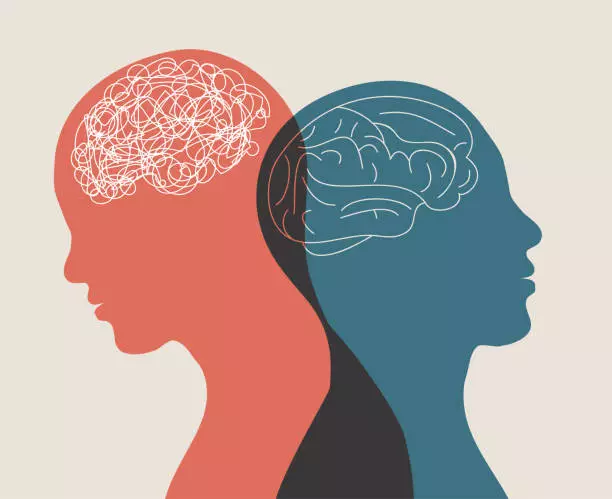All You Know About Mental illness, Symptoms, Cause and Treatment

Posted Date: February 7th, 2023
What is mental illness?
Mental illness refers to a wide range of mental health conditions that can significantly impact an individual’s thoughts, emotions, behaviors and overall functioning. It is a common and widespread issue that affects people of all ages, genders and backgrounds. Despite its prevalence, mental illness is often stigmatized, leading to a lack of understanding and support for those who suffer from it.
There are many different types of mental illnesses, including depression, anxiety, bipolar disorder, schizophrenia, eating disorders and more. Each type presents its own unique symptoms and challenges, but they all have the potential to cause significant distress and disruption to one’s life.
What is mental health?
It is important to understand that mental illness is not a personal weakness or a character flaw. Rather, it is a medical condition that can be caused by a combination of genetic, environmental and lifestyle factors. With the right support, many people with mental illness can successfully manage their symptoms and lead fulfilling lives.
In this blog, we aim to educate and inform about mental illness, demystify common misconceptions and provide resources for those who are struggling. Our goal is to create a safe and supportive space for anyone who has been affected by mental illness, either personally or through a loved one.
Mental Illness Symptoms
The symptoms of mental illness can vary widely depending on the type of illness and the individual. However, some common signs that someone may be struggling with a mental health issue include:
-
Persistent feelings of sadness, anxiety, or hopelessness
-
Extreme mood swings or irritability
-
Changes in sleep patterns or appetite
-
Loss of interest in previously enjoyable activities
-
Difficulty concentrating or making decisions
-
Feelings of worthlessness or guilt
-
Thoughts of self-harm or suicide
-
Delusions or hallucinations
-
Social isolation or withdrawal from loved ones
-
Unusual or irrational thoughts or behaviors
It’s important to note that everyone experiences ups and downs in their mood and behavior, but when these symptoms become persistent and interfere with daily life, it may be indicative of a mental illness. If you or someone you know is experiencing any of these symptoms, it is important to seek professional help from a mental health provider. Early intervention and treatment can greatly improve the chances of recovery.
When to see a Mental treatment doctor
It’s important to seek help from a mental health professional if you are experiencing symptoms of mental illness that are affecting your daily life and well-being. Some specific situations when you should consider seeking help include:
If you are feeling overwhelmed by persistent feelings of sadness, anxiety, or hopelessness.
If you are having difficulty functioning at home, school, or work due to your mental health.
If you are having thoughts of self-harm or suicide.
If you are experiencing changes in sleep, appetite, or energy levels.
If you are having trouble managing your emotions or maintaining relationships.
If you are struggling with substance abuse or addiction.
If you are experiencing delusions, hallucinations, or other symptoms that are affecting your reality perception.
It’s important to seek help as soon as possible, as early intervention can greatly improve the chances of recovery. A mental health professional can provide a diagnosis, develop a treatment plan and offer support and guidance throughout the recovery process.
Risk factors of Mental Health
There are several risk factors that can increase the likelihood of developing a mental illness. Some of the most common include:
-
Genetics: A family history of mental illness can increase the risk of developing certain conditions.
-
Trauma: Childhood abuse, neglect, or other traumatic experiences can increase the risk of mental health issues.
-
Brain chemistry: Imbalances in neurotransmitters and other chemicals in the brain can contribute to mental illness.
-
Substance abuse: Substance abuse can increase the risk of developing or worsening mental health issues.
-
Chronic medical conditions: Chronic medical conditions, such as heart disease or diabetes, can increase the risk of mental health problems.
-
Life events: Major life events, such as the loss of a loved one, divorce, or financial stress, can increase the risk of mental illness.
-
Social and economic factors: Poverty, homelessness and social isolation can increase the risk of mental health problems.
It’s important to understand that mental illness is not a personal failure or the result of a lack of willpower. Rather, it is a complex condition that can be caused by a combination of genetic, environmental and lifestyle factors. By understanding the risk factors, it may be possible to reduce the likelihood of developing a mental health issue or to seek treatment earlier if one does develop.
Complications Face with Mental Illness
Mental illness can have far-reaching and long-lasting effects on a person’s life. Some of the most common complications faced by individuals with mental illness include:
-
Decreased quality of life: Mental illness can interfere with daily functioning, relationships and overall well-being.
-
Substance abuse: Mental illness can increase the risk of substance abuse and addiction, which can make the symptoms of mental illness worse.
-
Physical health problems: Chronic stress, lack of self-care and substance abuse can contribute to physical health problems.
-
Social isolation: Mental illness can lead to social isolation and a lack of meaningful relationships.
-
Unemployment or underemployment: Mental illness can interfere with work performance, leading to unemployment or underemployment.
-
Homelessness: Mental illness can increase the risk of homelessness, particularly for individuals with limited financial resources.
-
Suicidal ideation: Mental illness can increase the risk of suicidal thoughts and behaviors.
These complications can be difficult to overcome, but with proper treatment and support, it is possible to manage the symptoms of mental illness and improve one’s quality of life. A mental health professional can work with you to develop a personalized treatment plan and offer ongoing support and guidance.
What are Classes of mental illness
Mental illness can be broadly classified into several categories based on the type of symptoms and their severity. Some of the most commonly recognized categories of mental illness include:
-
Anxiety disorders: A group of disorders characterized by excessive fear, worry, or nervousness. For examples such as general anxiety disorder, panic disorder, & social anxiety disorder.
-
Mood disorders: A group of disorders characterized by changes in mood, including depression and bipolar disorder.
-
Schizophrenia and other psychotic disorders: A group of disorders characterized by delusions, hallucinations and other symptoms that affect a person’s reality perception.
-
Eating disorders: A group of disorders characterized by abnormal or disturbed eating patterns. Examples include anorexia nervosa, bulimia nervosa and binge eating disorder.
-
Personality disorders: A group of disorders characterized by rigid, inflexible and enduring patterns of behavior that cause significant distress or impairment in social, occupational, or other areas of life.
-
Attention-deficit/hyperactivity disorder (ADHD): A neurodevelopmental disorder characterized by inattention, hyperactivity and impulsivity.
-
Obsessive-compulsive disorder (OCD): A disorder characterized by intrusive, unwanted thoughts (obsessions) and repetitive behaviors (compulsions) that a person feels compelled to perform.
It’s important to note that mental illness can be complex and can sometimes involve symptoms from multiple categories. A mental health professional can help diagnose the specific type of mental illness and develop a treatment plan.
What Medications should do for Mental treatment
Medications can be an important part of the treatment plan for many mental illnesses. Some of the most commonly prescribed medications for mental health conditions include:
-
Antidepressants: Used to treat depression, anxiety disorders and other mental health conditions. Examples include selective serotonin reuptake inhibitors (SSRIs), tricyclic antidepressants and monoamine oxidase inhibitors (MAOIs).
-
Antipsychotics: Used to treat schizophrenia, bipolar disorder and other psychotic disorders. Examples include clozapine, risperidone and olanzapine.
-
Mood stabilizers: Used to treat bipolar disorder. Examples include lithium, valproic acid and lamotrigine.
-
Anxiolytics: Used to treat anxiety disorders. Examples include benzodiazepines, such as alprazolam (Xanax) and lorazepam (Ativan).
-
Stimulants: Used to treat attention-deficit/hyperactivity disorder (ADHD). Examples include methylphenidate (Ritalin) and amphetamines.
It’s important to understand that medications alone may not be sufficient to treat some mental illnesses and may need to be used in combination with therapy and other forms of treatment. A mental health professional can help determine the best course of treatment based on your specific needs and situation. Additionally, it’s important to work closely with a doctor or psychiatrist to monitor the effectiveness of the medications and to manage any side effects that may occur.
What are Myths and facts about mental health
Mental health is a complex topic that has been surrounded by many myths and misconceptions. Here are some common myths and the corresponding facts about mental health:
Myth:
Mental illness is a personal weakness or a character flaw.
Fact:
Mental illness is a medical condition, just like physical illness. It is not caused by personal weakness or a lack of willpower.
Myth:
Mental illness only affects a small portion of the population.
Fact:
Mental illness is a common and widespread problem. Approximately 1 in 5 adults in the United States experiences mental illness in a given year.
Myth:
People with mental illness are dangerous.
Fact:
The vast majority of individuals with mental illness are not violent and are no more likely to be dangerous than anyone else.
Myth:
You can’t recover from mental illness.
Fact:
With proper treatment and support, many individuals with mental illness can recover and lead fulfilling lives.
Myth:
Mental health problems are rare in children.
Fact:
Mental health problems can affect children and adolescents, just as they can affect adults. Early identification and treatment are important for the best outcomes.
It’s important to educate yourself about mental health and to challenge myths and misconceptions. By doing so, we can reduce stigma and promote greater understanding and support for those who are struggling with mental health challenges.
In conclusion, mental health is a critical aspect of overall health and well-being that should not be ignored. Mental illnesses are common and they can have a significant impact on a person’s quality of life. Early identification and treatment are crucial for the best outcomes and a combination of medication, therapy and other forms of support can be effective in helping individuals with mental illness recover and lead fulfilling lives.
It’s also important to educate ourselves about mental health, dispel myths and misconceptions and work towards reducing the stigma associated with mental illness. By doing so, we can help create a more inclusive and supportive environment for those who are struggling with mental health challenges.
If you or someone you know is experiencing symptoms of mental illness, it’s important to seek help from a mental health professional. With the right support and resources, recovery is possible and people can go on to lead fulfilling, healthy lives.
Related Posts
Dr. Emily Carter is a seasoned health writer and wellness advocate at Healths News Today. With over a decade of experience in the healthcare industry, she specializes in translating complex medical information into easy-to-understand content that empowers readers to make informed decisions about their health.




